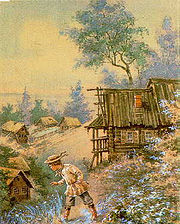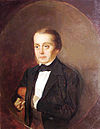- Oblomov
-
Oblomov 
Author(s) Ivan Goncharov Original title Обломов Country Russia Language Russian Publication date 1859 Oblomov (Russian: Обломов)[1] is the best known novel by Russian writer Ivan Goncharov, first published in 1859. Oblomov is also the central character of the novel, often seen as the ultimate incarnation of the superfluous man, a symbolic character in 19th-century Russian literature. Oblomov was compared[citation needed] to Shakespeare's Hamlet as answering 'No!' to the question "To be or not to be?" Oblomov is a young, generous nobleman who seems incapable of making important decisions or undertaking any significant actions. Throughout the novel he rarely leaves his room or bed and famously fails to leave his bed for the first 150 pages of the novel.[2] The book was considered a satire of Russian nobility whose social and economic function was increasingly in question in mid-nineteenth century Russia.
The novel was wildly popular when it came out in Russia and a number of its characters and devices have had an imprint on Russian culture and language. Oblomovshchina (Russian: Обломовщина, or oblomovism) has become a Russian word used to describe someone who exhibits the personality traits of sloth or inertia similar to the novel's main character.
Contents
Influence
Goncharov's work added new words to the Russian lexicon, most notably "Oblomovism" (sometimes also rendered as "Oblomovitis"; Russian: обломовщина, oblomovshchina) — a sort of fatalistic laziness that many critics (for example, Nikolai Dobrolyubov in his 1859 article "What is Oblomovism?"[3]), described as an integral part of Russian character. Stolz suggests that Oblomov's death was the result of "Oblomovism".
The term Oblomovism appeared in a speech given by V.I. Lenin in 1922, where he says that:
- Russia has made three revolutions, and still the Oblomovs have remained... and he must be washed, cleaned, pulled about, and flogged for a long time before any kind of sense will emerge.
A character named "Oblomov" in art patron Peggy Guggenheim's memoir "Out of This Century" was identified by poet Stephen Spender as Samuel Beckett, her one-time lover.[4]
Popular adaptations
 A 1979 film poster for Nikita Mikhalkov's screen version of Oblomov, with Oleg Tabakov in the title role.
A 1979 film poster for Nikita Mikhalkov's screen version of Oblomov, with Oleg Tabakov in the title role.
Son of Oblomov, a comedy adaptation for the theatre, opened at the Lyric Theatre, Hammersmith, in 1964 and transferred to the Comedy Theatre in the West End the same year. It starred Spike Milligan, who used less and less of the original script until eventually the entire piece was improvised farce; also in the cast were Joan Greenwood, Bill Owen, and Valentine Dyall.
Oblomov was adapted to the cinema screen in the Soviet Union by Nikita Mikhalkov in 1979, as A few days from the life of I.I. Oblomov (Несколько дней из жизни И. И. Обломова; 145 minutes). The Cast and Crew: Actors -- Oleg Tabakov as Oblomov, Andrei Popov as Zakhar, Elena Solovei as Olga and Yuri Bogatyrev as Andrei; cinematography by Pavel Lebechev; screenplay by Mikhalkov and Aleksander Adabashyan; music by Eduard Artemyev; produced by Mosfilm Studio (Moscow).
In 1989 BBC TV made an English language dramatisation of the novel, starring Cheers actor George Wendt in the title role.
In 2005 BBC Radio 4 made a two-part English language dramatisation, heralding the lead character as a tragic-comic hero for a couch potato generation. It was adapted by Stephen Wyatt, produced and directed by Claire Grove and starred Toby Jones as the lead, supported by Trevor Peacock, Claire Skinner, Clive Swift, Gerard McDermott, Nicholas Boulton, and Richenda Carey. Olga's singing voice was provided by Olivia Robinson, with Helen Crayford on piano.
In 2008 an adaptation was produced for the English service of the Russian national broadcaster, the Voice of Russia.[5]
Translators of Oblomov
- Stephen Pearl, recent translator of Ivan Aleksandrovich Goncharov's Oblomov.
- David Magarshack
- Natalie Duddington
- Marian Schwartz
- C.J. Hogarth (1915)
References
- ^ Oblomov is pronounced [ɐˈbloməf], with the stress on the second syllable.
- ^ http://www.kirjasto.sci.fi/ivangont.htm
- ^ Добролюбов, Н. А. (1859). "Что такое обломовщина? (in Russian)". Отеч. записки (I–IV). http://az.lib.ru/d/dobroljubow_n_a/text_0022.shtml. Retrieved 9 November 2006.
- ^ New York Times, October 12, 1958
- ^ http://english.ruvr.ru/radio_broadcast/2248881/2316652/
External links
- Oblomov Public Domain translation from 1915 (Severely abridged by the translator)
- Digital Oblomov A digital companion to the novel. Includes information about the author, different translations, adaptations for the screen and the stage, and the work's influence.
- Oblomov The original Russian text
- Full text of Oblomov in the original Russian at Alexei Komarov's Internet Library
- Oblomov at the Internet Movie Database
- http://www.kirjasto.sci.fi/ivangont.htm
Works by Ivan Goncharov Novels A Common Story (1847) · Oblomov (1859) · The Precipice (1869)

Autobiography An Uncommon Story (1924)
Categories:- 1859 novels
- Russian novels
- Novels set in Russia
Wikimedia Foundation. 2010.
